
November 10
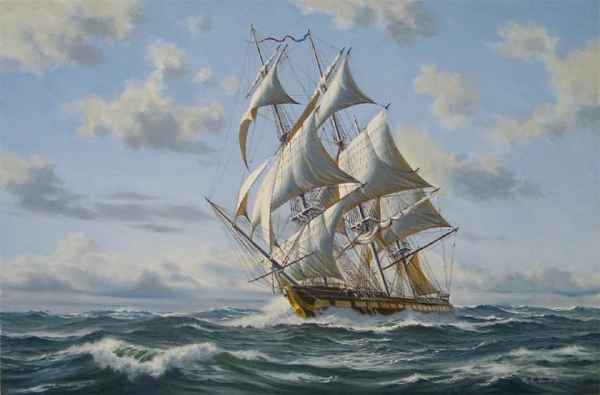
1853: From a letter from Commodore Isaac Mayo, commander of the US African Squadron, reporting the capture of the slave trader H. N. Gambrill:
I beg leave to state my belief that, the Slave trade is reviving on this Southern Coast, and that the American flag is extensively used in its prosecution. Several cargoes of Slaves have been recently carried off in American Vessels, which having regular papers, defy the English cruisers, and hope to elude the vigilance of our Squadron, knowing it consists of only Three Vessels, serving on a coast of great extent. [For the full text, Click here.]
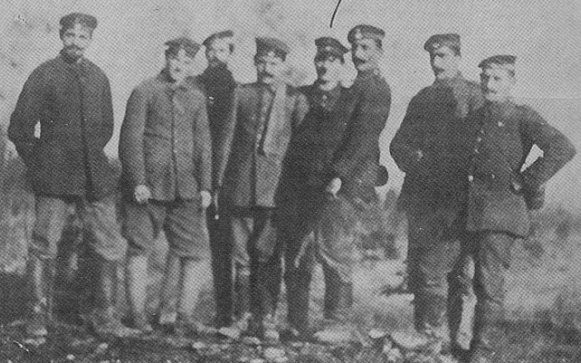 Hitler and his fellow dispatch runners
Hitler and his fellow dispatch runners
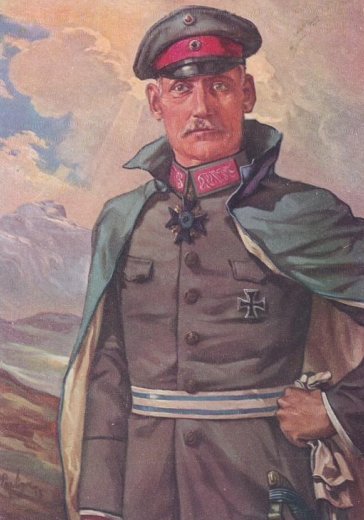
This Order of the Day from Crown Prince Rupprecht is published in Bavaria's most popular newspaper, the Münchner Neueste Nachrichten:
Soldiers! The eyes of the whole world are upon you! We cannot let up in the fight to finally break the arrogance of our hated enemy. Already countless [enemy] officers and men have voluntarily surrendered. But the greatest, decisive battle awaits us: You must therefore hold out to the last man. You will persevere, so as not to let them out of your teeth. We must be victorious, we want to be victorious, and we will be victorious. Rupprecht, Kronprinz von Bayern.
Click to Enlarge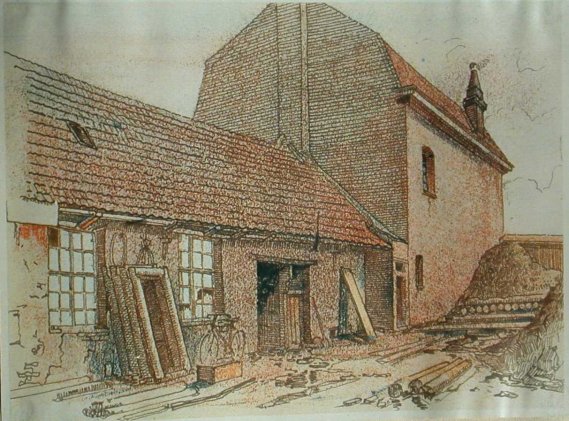
Fromelles Watercolor, 1915, by Hitler
1916 Various:
World War I: An Italian corps pushes an Austrian corps north and links with Sarrail's main body at Lake Ochrida in Albania.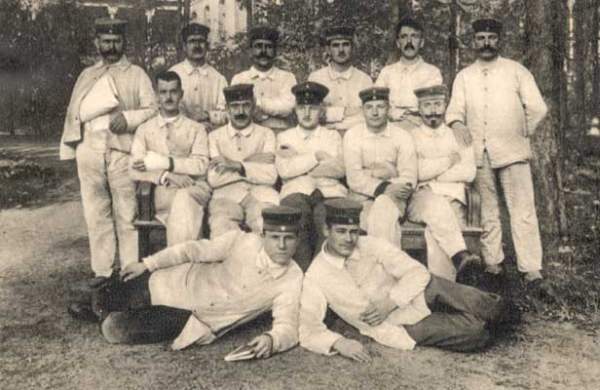
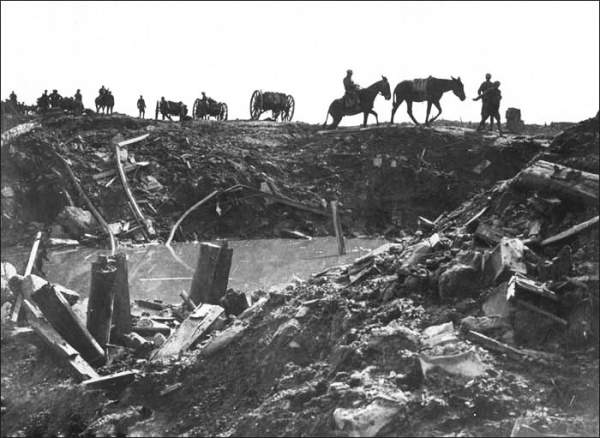
1918 World War I: Various: H. Collinson Owen on the Surrender of the Gallipoli Peninsular:
The final act to one of the greatest dramas of the war was enacted yesterday when, in accordance with the terms of the armistice with Turkey, British troops landed unopposed to occupy the Gallipoli Peninsula. We left Mudros in a destroyer at 4 in the morning to see the landing, and arrived off Cape Relies about 9. The first outward sign that we were in such historic waters was the sight of a mast sticking up off the rocky coast of Imbros. This marked the spot where the big monitor Raglan and the smaller one, M-28, went down when standing up hopelessly against the Goeben and the Breslau at the time of their ill-starred sortie last year. Later in the day, up toward the Narrows, we saw the remains of submarine E-15, which ran ashore when trying to ascend the strait and was torpedoed from a launch by our own men. [For the full text, Click here.]
Official British Observer G. Ward Price on the Surrender of Constantinople:
At Chanak lay a grey transport steamer with British troops on board. She had arrived a little before us, and the khaki figures that lined her rail, staring curiously at the low-lying little town, with its old stone castle and its throng of equally interested inhabitants, were on their way to garrison the forts of the Narrows further up. With a Turkish pilot on board to guide us through the rest of the minefields, the destroyer made her way on into the Sea of Marmora, and increased her speed to thirty knots. So that at 3 o'clock this afternoon, under a cloudy sky, but one filled with the diffused lights of the East, we rounded the point of the old Seraglio and entered the Golden Horn. There was no demonstration of any kind. It seemed as if no one had even noticed the arrival of this herald of the British fleet. But as we drew near to the quay one saw that the houses and windows were thronged with people. The crowd had an unusual tone of red about it, derived from all the crimson fezzes bobbing to and fro as their wearers strained for a glimpse. And a few waved handkerchiefs. A German officer stood on the quay close to where the destroyer gradually came alongside. He was more interested than any one, but affected indifference and yawned with care from time to time. A little group of German soldiers and sailors gradually formed behind him as if for mutual moral support. For years they had been the self-ordained military gods of this place, but now their altars are overthrown and they see Turkish naval officers of high rank hurrying past them to pay respects to the representative of a nation they once thought they could despise. We are, indeed, much surrounded by an unwelcome neighbourhood of Germans. Germans look down on us from their office windows opposite the quay. Here in my bedroom at the Pera Palace Hotel there are Germans talking in the rooms on either side of me as I write. I gather from fragments overheard that they are packing up. One is pleased to think that their compatriots throughout Turkey are doing the same. As we drove up from the quay, too, there seemed a considerable number of Germans, and also Austrians, in the streets. The Austrians saluted the party of British officers. The Germans swaggered by with a stare, the non-commissioned officers and men smoking cigars, which give them to English eyes a peculiar appearance of pretentiousness.
Weimar: The military High Command and the new German republic strike a deal. The generals promise to protect this new republic, even though they despise its very existence. Ebert, in return, promises to prevent the socialist revolution threatening to turn Germany into another Russia. Friedrich Ebert:
The ex-Chancellor, Prince Max of Baden, in agreement with all the Secretaries of State, has handed over to me the task of liquidating his affairs as Chancellor. I am on the point of forming a new Government in accord with the various parties, and will keep public opinion freely informed of the course of events. The new Government will be a Government of the people. It must make every effort to secure in the quickest possible time peace for the German people and consolidate the liberty which they have won. The new Government has taken charge of the administration, to preserve the German people from civil war and famine and to accomplish their legitimate claim to autonomy. The Government can solve this problem only if all the officials in town and country will help. I know it will be difficult for some to work with the new men who have taken charge of the empire, but I appeal to their love of the people. Lack of organization would in this heavy time mean anarchy in Germany and the surrender of the country to tremendous misery. Therefore, help your native country with fearless, indefatigable work for the future, every one at his post. I demand every one's support in the hard task awaiting us. You know how seriously the war has menaced the provisioning of the people, which is the first condition of the people's existence. The political transformation should not trouble the people. The food supply is the first duty of all, whether in town or country, and they should not embarrass, but rather aid, the production of food supplies and their transport to the towns. Food shortage signifies pillage and robbery, with great misery. The poorest will suffer the most, and the industrial worker will be affected hardest. All who illicitly lay hands on food supplies or other supplies of prime necessity or the means of transport necessary for their distribution will be guilty in the highest degree toward the community. I ask you immediately to leave the streets and remain orderly and calm.
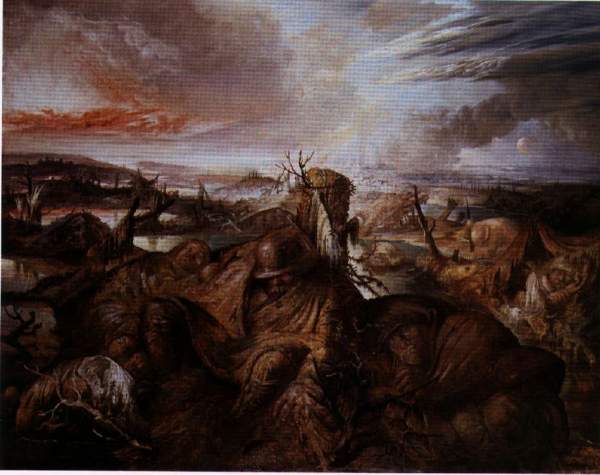
Adolf Hitler (Oct 15 - Nov 10): Gefreiter Hitler, still recovering at the Prussian Reserve Hospital at Pasewalk from the effects of a gas attack near Werwick on Oct 14, hears the stunning news that the Kaiser has fled Germany for exile in Holland. The pastor who brings the news breaks down weeping, imploring his listeners to pray for the coming new republic. Hitler's blindness, which had been slowly getting better, returns full force as a hysterical reaction, and he goes into a deep depression.
From Adolf Hitler's Mein Kampf:On November 10th the local pastor visited the hospital for the purpose of delivering a short address. And that was how we came to know the whole story.
I was in a fever of excitement as I listened to the address. The reverend old gentleman seemed to be trembling when he informed us that the House of Hohenzollern should no longer wear the Imperial Crown, that the Fatherland had become a "Republic", that we should pray to the Almighty not to withhold His blessing from the new order of things and not to abandon our people in the days to come. In delivering this message, he could not do more than briefly express appreciation of the Royal House, its services to Pomerania, to Prussia, indeed, to the whole of the German Fatherland; and here he began to weep. A feeling of profound dismay fell on the people in that assembly, and I do not think there was a single eye that withheld its tears. As for myself, I broke down completely when the old gentleman tried to resume his story, by informing us that we must now end this long war, because the war was lost, he said, and we were at the mercy of the victor. The Fatherland would have to bear heavy burdens in the future. We were to accept the terms of the Armistice, and trust to the magnanimity of our former enemies. It was impossible for me to stay and listen any longer. Darkness surrounded me as I staggered and stumbled back to my ward, and buried my aching head between the blankets and pillow.
In four years of war, the List Regiment has lost 3,754 dead, 8,795 wounded, with 678 taken prisoner. This is somewhat above the average for the German Armed Forces as a whole.
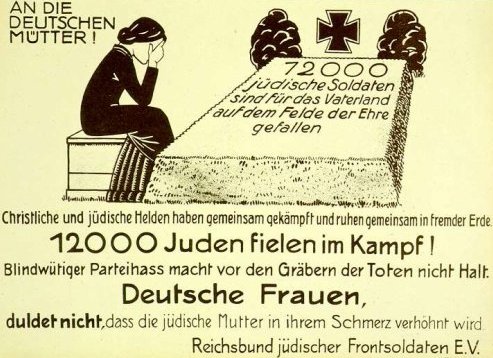
Throughout the length of the war, fifty-nine Jews served in the List Regiment, sixteen of these as officers. Thirty percent of the Jews in the List Regiment were honored for bravery, and seventeen percent were killed in action.[For further details, Click here.]
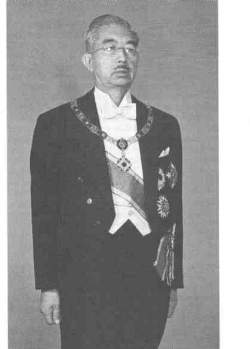
1928 Various: Hirohito is crowned Emperor of Japan: He had effectively become head of state and named Regent when his father became ill in 1920. He will rule until his death in 1989.
Remarque publishes All Quiet on the Western Front:
On this day in 1928, the first installment of All Quiet on the Western Front, Erich Maria Remarque's acclaimed novel of World War I, appears in the German magazine Vossische Zeitung.
Remarque (born Erich Paul Remark) was born in 1898 in lower Saxony to a family of French ancestry; he enlisted in the German army at the age of 18 and headed to fight on the Western Front, where he was wounded five times, the last time seriously. Returning to Germany after the war, he changed his name back to the French spelling and worked various jobs— teacher, stonecutter, race-car driver, sports journalist— while working on his first novel.
The protagonist of that novel, All Quiet on the Western Front—its German title, Im Westen nichts Neues literally translates as In the West Nothing New— is Paul Baumer, a young German soldier fighting in the trenches of World War I. The story opens in 1917, when half of Baumer's company— many of them schoolmates from back in Germany— has been killed in battle. Over the course of the book, Paul himself is injured and hospitalized, goes home on leave and returns to the front, only to be killed a week or so before the armistice in 1918.
From November 10 to December 9, 1928, All Quiet on the Western Front was published in serial form in Vossische Zeitung magazine. It was released in book form the following year to smashing success, selling a million and a half copies that same year. Although publishers had worried that interest in the Great War had waned more than 10 years after the armistice, Remarque's realistic depiction of trench warfare from the perspective of young soldiers struck a chord with the war's survivors— soldiers and civilians alike— and provoked strong reactions, both positive and negative, around the world. Eventually translated into over 20 languages, the novel was adapted into an acclaimed American film in 1930.
With All Quiet on the Western Front , Remarque emerged as an eloquent spokesperson for a generation that had been, in his own words, "destroyed by war, even though it might have escaped its shells." Remarque's harshest critics, in turn, were his countrymen, many of whom felt the book denigrated the German war effort, and that Remarque had exaggerated the horrors of war in order to further his pacifist agenda. Not surprisingly, the strongest voices against Remarque came from the emerging National Socialist (Nazi) Party, an ultranationalist group in Germany led by the future fuhrer, Adolf Hitler. In 1933, when the Nazis rose to power, All Quiet on the Western Front became one of the first "degenerate" books to be publicly burnt.
Remarque would go on to publish nine more novels, all dealing with the horror and futility of war and the struggle to understand its purpose. His last novel, The Night in Lisbon, was unsparing in its condemnation of World War II as Adolf Hitler's attempt to perpetrate the extermination of Jews and other "nonpeople" on behalf of the "master race." After his German citizenship was revoked in 1938, Remarque emigrated to the United States, becoming a naturalized citizen in 1947. A frequent participant in New York City nightlife in the 1930s and a companion for several years in Hollywood of the actress Marlene Dietrich, Remarque lived for most of his later life at Porto Ronco, on the shore of Lake Maggiore in Switzerland. He died at Locarno in 1970 with his wife, the actress Paulette Goddard, at his side. (History.com)
1933: Adolf Hitler makes a campaign speech to workers of the Siemens plant in Berlin-Siemensstadt, proclaiming to his audience that he is one of them.
1933 Austria: Martial law is declared.
1938: Hitler in a speech to hundreds of German journalists, discounts the prospects for peace and urges the press to help persuade the German public to support his regime in the event of any future war.
1938: From an order by SS Gruppenfuehrer Heydrich, sent to all headquarters of the State Police and all districts and subdistricts of the SD:
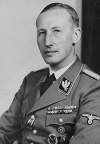
As soon as the course of events of this night allows the use of the officials employed for this purpose, as many Jews, especially rich ones, as can be accommodated in the existing prisons are to be arrested in all districts. For the time being only healthy men, not too old, are to be arrested. Upon their arrest, the appropriate concentration camps should be contacted immediately, in order to confine them in these camps as fast as possible. Special care should be taken that the Jews arrested in accordance with these instructions are not ill-treated.
1938 Holocaust: The Gestapo closes the Central Organization of German Citizens of the Jewish Faith.
1939 Church and Reich: The Papal Nunzio in Berlin delivers the special personal congratulations of Pope Pius on Hitler's miraculous escape from the assassination attempt of November 8.
1940: Hitler authorizes production of the ME 321 glider.
From the summary of Messerschmitt's SBS interview:On November 10, 1940, Professor Messerschmitt completed the drawings for a glider capable of carrying a 21-ton tank which was then Germany's heaviest model. This glider, known as the ME 321, was to be towed by three ME 110s and was to be assisted in its takeoff by eight rockets, four under each wing. On November 7, 1940, Professor Messerschmitt saw Hitler and proposed to him that construction of these gliders be undertaken. He stated that he did not wish to take the matter up through the Air Ministry and preferred to negotiate directly with Todt. Hitler agreed. Messerschmitt saw Todt in Stuttgart two days later and enlisted his help in obtaining the necessary steel and fabrics. The first glider was ready for flight on 28 February 1941 and proved successful. Two hundred were completed by June 1941. They were eventually used in the Russian campaign, specifically in occupying the Orel pocket.
[See: Wunderwaffen: Hitler's Deception and the History of Rocketry.]1941 Various:
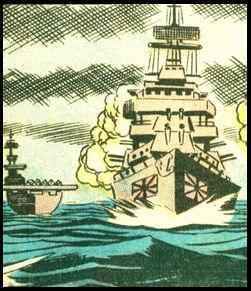
From the Diary of Captain Shigeshi Uchida:
At the Army General Staff, had a conference for table-top maneuvers in the presence of the Emperor and also had a preliminary exercise for it. (Dillon)
[See: Countdown to Infamy: Timeline to Pearl Harbor.]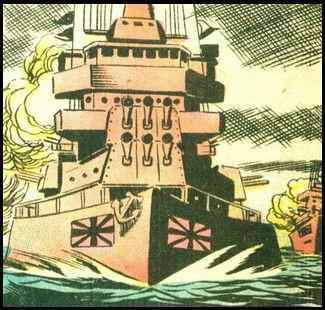
Against the sailing of American armed merchant marine ships through belligerent areas on the sea, Hitler announced that Germany issued (orders) to attack any of them found in those areas for the sake of Germany's self-defense. It is reported that some part of the German Forces are being sent back to Germany from the Soviet Union, for such damage has been inflicted upon Russia to the extent of Russia's not being able to stand up again for the time being. Which course will the new operation take? Another rumor runs that a new order to attack Moscow was issued. (Dillon)
From Truman by David McCullough:The continued ranting of Adolf Hitler on the radio left him [Senator Harry Truman] increasingly gloomy. He met for lunch in Washington with Robert Danford, his old superior officer at Camp Doniphan, now a general, and talking of events in Europe and Germany's apparent military superiority, they both became "mighty blue." Harry feared a Nazi world. He dug out some of his old Army maps of France and tacked them to his office wall to follow the fighting. In open opposition to such strident isolationists in the Senate as Wheeler, Borah, and his fellow Missourian, Bennett Clark, he spoke out still more and more strongly for "preparedness," called on the President to summon a special session of Congress to revise the Neutrality Act of 1936, which he himself had voted for but now realized was a mistake.
In a speech in Missouri in October, he said the three dictators, Stalin, Hitler, and Mussolini, had reverted to the code of "cave-man savagery." American neutrality was obsolete in the face of such reality, he said. The arms embargo must be lifted. "I am of the opinion that we should not help the thugs among nations by refusing to sell arms to our friends." With Senator James Byrnes of South Carolina, he urged larger appropriations for defense, an immediate buildup of the Army, and a Navy "second to none." He was outraged by the arguments of the America First movement and the speeches made by Charles Lindbergh. On November 11, Armistice Day, he wrote to Bess: "You know, it makes some of us who went on that first Crusade...wonder sometimes just what fate really holds for civilization."
1942 World War II: Various: Germans take Vichy France:
On this day in 1942, German troops occupy Vichy France, which had previously been free of an Axis military presence.
Since July 1940, upon being invaded and defeated by Nazi German forces, the autonomous French state had been split into two regions. One was occupied by German troops, and the other was unoccupied, governed by a more or less puppet regime centered in Vichy, a spa region about 200 miles southeast of Paris, and led by Gen. Philippe Petain, a World War I hero. Publicly, Petain declared that Germany and France had a common goal, "the defeat of England." Privately, the French general hoped that by playing mediator between the Axis power and his fellow countrymen, he could keep German troops out of Vichy France while surreptitiously aiding the antifascist Resistance movement.
Petain's compromises became irrelevant within two years. When Allied forces arrived in North Africa to team up with the Free French Forces to beat back the Axis occupiers, and French naval crews, emboldened by the Allied initiative, scuttled the French fleet off Toulon, in southeastern France, to keep it from being used by those same Axis powers, Hitler retaliated. In violation of the 1940 armistice agreement, German troops moved into southeastern-Vichy, France. From that point forward, Petain became virtually useless, and France merely a future gateway for the Allied counteroffensive in Western Europe, namely, D-Day. (History.com)
President Roosevelt announces the breaking off of diplomatic relations with Vichy France.
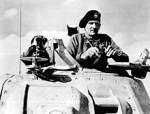
North Africa: The British 8th Army under Montgomery takes Sidi Barrani in Libya recently evacuated by Panzerarmee Afrika. [See: The Mediterranean Strategy.]
1943 World War II: The Red Army achieves a breakthrough near Gomel in Belorussia. [See: Was Adolf Hitler a 'Great' Military Leader?]
1944 World War II From an Albert Speer circular:
All men and women of the NSDAP, its subsidiaries and affiliated bodies in the works will, in accordance with instructions from their Kreisleiter, be warned by their local group leaders (Ortsgruppenleiter) and be put under obligation to play their part in keeping foreigners under the most careful observation. They will report the least suspicion to the works foreman, which he will pass on to the defense deputy or, where such a deputy has not been appointed, to the police department concerned, while at the same time reporting to the works manager and the local group leader will exert untiringly and continuously their influence on foreigners, both in word and deed, in regard to the certainty of German victory and the German will to resist, thus producing a further increase of output in the works. Party members, both men and women, and members of Party organizations and affiliated bodies must be expected more than ever before to conduct themselves in an exemplary manner.
Edited by Levi Bookin (Copy editor) Click to join 3rdReichStudies Disclaimer: This site includes diverse and controversial materials--such as excerpts from the writings of racists and anti-Semites--so that its readers can learn the nature and extent of hate and anti-Semitic discourse. It is our sincere belief that only the informed citizen can prevail over the ignorance of Racialist "thought." Far from approving these writings, this site condemns racism in all of its forms and manifestations.
levi.bookin@gmail.com










Fair Use Notice: This site may contain copyrighted material the use of which has not always been specifically authorized by the copyright owner. We are making such material available in our efforts to advance understanding of historical, political, human rights, economic, democracy, scientific, environmental, and social justice issues, etc. We believe this constitutes a "fair use" of any such copyrighted material as provided for in section 107 of the US Copyright Law. In accordance with Title 17 U.S.C. Section 107, the material on this site is distributed without profit to those who have expressed a prior interest in receiving the included information for research and educational purposes. If you wish to use copyrighted material from this site for purposes of your own that go beyond 'fair use', you must obtain permission from the copyright owner.
Please Note: The list-owner and the moderator of 3rdReichStudies are not responsible for, and do not necessarily approve of, the random ads placed on our pages by our web server. They are the unfortunate price one pays for a 'free' website.



